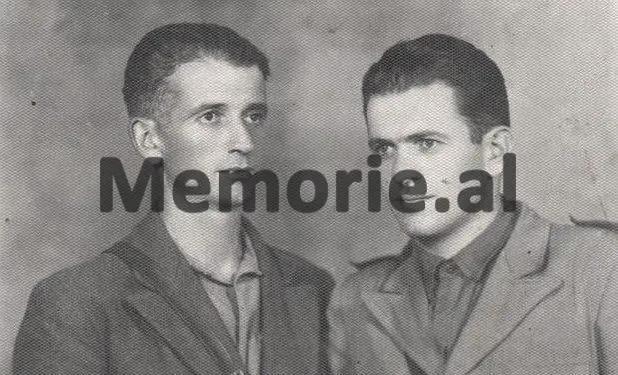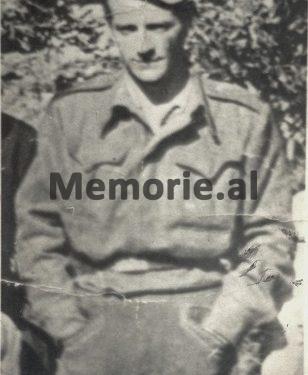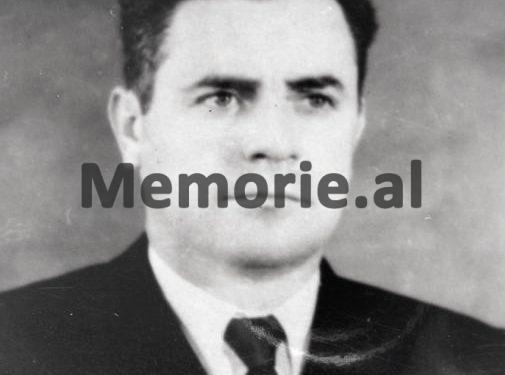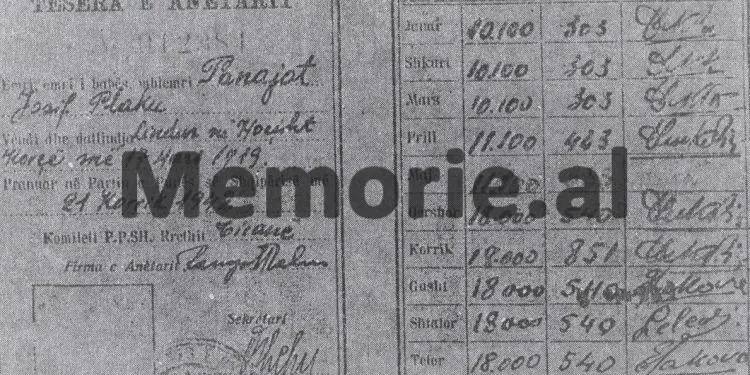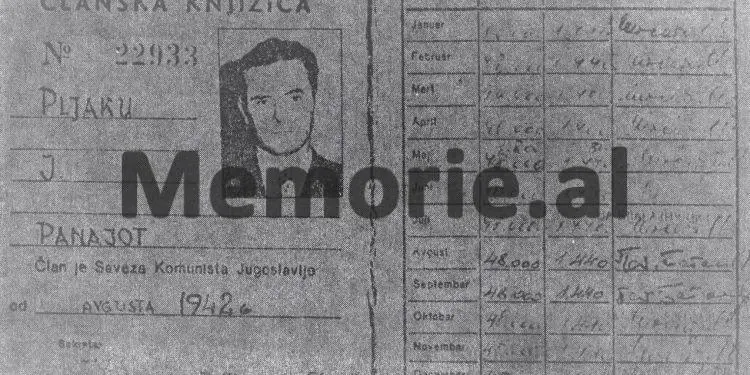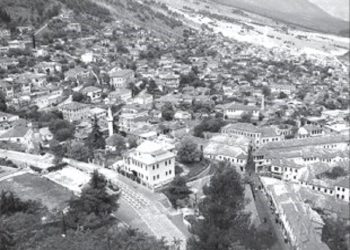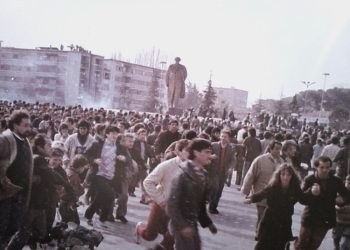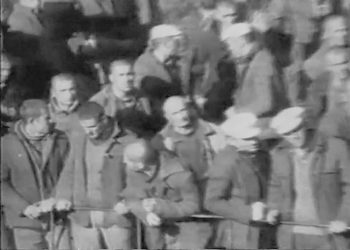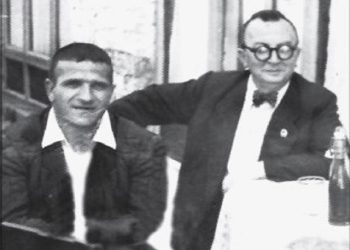By Alqi Koçiko
Memorie.al / “Like Dante’s hell, communism has different levels of horror and misery. Last week, a cabinet minister in the deeply Stalinist Albanian government, Major General Panajot Plaku, fled his homeland, wandering in the middle of the night along the paths he first learned as a partisan in World War II, to in Yugoslavia. The old man is the communist of the most important rank among the 5-6 thousand Albanians, who have left the darkness of their homeland, since the time of the war…”! This entry is part of a short article from the June 3, 1957 edition of the American magazine ‘Time Magazine’.
The great escape took place at midnight on May 15-16, 1957, that is, about two weeks ago; the news was shocking and the effect lasted for several years, because although within an isolated country the drug is found very quickly, labeling the soldier known as; “traitor, enemy, agent”, etc., etc., the uproar would continue outside Albania, in the East and in the West.
So much so that the issue of Panajot Plaku would also become the object of conversation between Enver Hoxha and Mehmet Shehu. on the one hand, and Nikita Sergeevich Khrushchev. on the other hand. “Why don’t you revise your attitude towards Panajot Plaku, and let him return to his homeland”? suggested the Soviet leader, during his visit to Albania in 1959. The answer left no room for equivocation: “We have no intention of pardoning Panajo. Even if you bring him to Albania, we will hang him in the middle of Tirana”!
Based on the study of some interesting documents of the historian Albert Kotini, we have tried in this article to reconstruct the long-forgotten history of Panajot Plakut. The escape of the Albanian minister was not accidental. It was not even the machinations of agencies, from those that the communist dictatorship had no difficulty in articulating: “Dali Ndreu and Liri Gega were caught without being able to escape, while Panajot the Elder managed with the help of Mehmet Shehu and Kadri Hazbiu”. as it would be said many years later.
The story seems to be much simpler than that, his life was being personally endangered, as almost all the prominent people of his family and relatives were being eliminated one by one. And in the country that according to Time; “one million and 250 thousand inhabitants are ruled by 48 thousand communists who swear loyalty to the beautiful and cruel dictator Enver Hoxha”, these phenomena were not unusual. However, the behavior of the regime towards Panajot Plaku and his family was unusual and severe even for a dictatorship.
In his personal card with number 21, the following information is given: “He fled to Yugoslavia on May 15, 1957. He was born in Hoçisht, Korça, on March 17, 1919. He speaks and writes Russian, Italian and less English and French. Josif Plaku, like Panayoti’s father, was arrested in 1940 by the regime in force. He has two brothers and two sisters, named Kalo, Koço, Theodora and Meri Plaku. He owned 18 ha. land, 2 houses, 7 cows and three horses, all of which he handed over to the Agrarian Reform, with the exception of one dynymi.
He graduated from primary school 1926-1931, in Hoçisht, Technical high school, Unique school 1934-1936, in Korça and “Normal” school, 1936-1941 in Elbasan. Member of the Communist Party since July 21, 1942, with tessera number 012334, issued by the Tirana Party Committee. Not expelled from the party. He was arrested on April 12, 1942 by the Italian fascists for participating in the demonstration and was kept in prison for 3 months. After the war, he was with delegations in Italy and the Soviet Union. All members of the family and the wife, Vjollca, were participants in the Anti-Fascist War. On November 28, 1944, he was promoted to lieutenant colonel.
In the work description, signed by the Minister of People’s Defense, Beqir Balluku, all other data are listed, from the first promotion after the war, as a colonel, on July 1, 1951, the duties in the war as a simple partisan in the Devolli detachment , up to deputy commissioner of the First Brigade. We must not forget to mention the fact that Panayoti had an uncle in America, Vangjelin, an intellectual with two doctorates. He returned after his studies in 1948-50 at the Soviet Military Academy “Voroshilov”, as a division commander.
What stood out about Panajot Plaku, apart from the talent and intelligence that stood out among his entire tribe, was his free spirit, his blunt opinion even when he contradicted his superiors, which in the official jargon would be translated as: “It is not disciplined to the degree that a divisional commander should be, and he follows orders with great difficulty, he esteems himself highly. I want strong control and seriousness from above”.
And he who had not made any self-criticism until 1950, is forced to do so after returning from the Soviet Union, “in front of the general comrades; Mehmet Shehu, Beqir Balluku, Bedri Spahiu and Teodor Heba”. But what happened in the life of Panajo Plaku, until he decided to “betray”?
Panayoti’s brother, Jorgo Plaku, was declared a martyr, after he was killed on January 7, 1944, according to official statements, “in an effort with the enemies”, but in fact he was shot from behind, while he was walking in a convoy with his friends near Voskopoja, and when “enemies” were nowhere. Although the witnesses had remained silent since then, the family members always had their doubts. The turn would then come to Panayoti’s other brother, Kalo the Elder, two years younger.
Battalion commissar during the war, Kalo was appointed in 1945 in Berat, as an officer of the Ministry of the Interior.
Seeing the tortures and raids of entire families by the newly installed regime, he is disgusted and asks to be released from his uniform. He switched to agriculture and in 1952 was appointed director of the Sukthi farm. Immediately after him, two former employees of Sigurimi were appointed to the management positions of the farm, who would follow him for four years in a row.
On June 12, 1956, Kalo Plaku left early in the morning for work, because the harvest campaign was starting. In the evening, his new driver (arrived a year ago, and then with a driving career in the Central Committee of PPSh and in embassies), informs him that the car has broken down. Spend the night sleeping and the next morning; drink a glass of buttermilk that would be the last. He foamed at the mouth and died at the age of 35, “because his heart was enlarged”!
As soon as his brother’s body arrives at home, Panajoti kicks everyone out, takes the corpse and takes it to Tirana for an autopsy. He asks Llambi Ziçishti, the Minister of Health, to do the autopsy, and the answer was; “Enlargement of the heart caused death.” But a Soviet doctor also participated in the autopsy. Her finding? The order of the cause-and-effect relationship changed: “It was death that brought about the enlargement of the heart.” Panayiot demanded further answers from Hungary, but they never came.
All the members of the Political Bureau, with Enver in charge, come to the minister’s house without a portfolio for consolation. When Panayoti repeats the Soviet doctor’s conclusion to the leader, asking him for another analysis for his brother, he turns dark and remains silent. All the more so that some time ago, (as the former high official of the first years after liberation, Nexhmi Ballka, stated after the 90s), he had a debate with Panayoti, as the latter did not agree at all , for Rita Marko to enter the Political Bureau.
Panajot Plaku was noticing that they were killing, degrading or expelling from the party, for one reason or another, all his family members and the tribe that had produced only partisans and later a full 28 idealistic communists and talented individuals. At the same time, he had been promoted to minister, which his trained mind immediately interpreted as a pat on the shoulders before the beheading. So he concluded that his turn had come. He decided to escape. He orders the driver to get the car ready, because they will go to Pogradec for work. In Qafë Thane, he goes down a bit to “get some sleep”, takes a monopath and never comes back.
“I ran away from Albania because Enver Hoxha poisoned my brother”. The news was reported by the Yugoslav news agency TANJUG. After the initial shock, Tirana immediately takes countermeasures and in the official press, an article is published where the mother of the “traitor”, Kostandina Plaku, curses the milk she gave her son. But what had actually happened?
According to the accounts in the early 90s of Pandora Plaku, the wife of the poisoned Kalo, Panayoti’s younger brother and the talented geologist Koço Plaku, received a strange invitation: “Frok Pjetër Gega, newly elected to the Central Committee of the APS and the neighbor in front of our house, had called Koço to his house and after 3-4 hours of talks between them, Koço comes with the text of the article in hand.
With a frown on his face, with a hoarse voice, he hands the letter to his mother and says: “Sign it, you wanted the rest of us too.” It is understood that they had already given the text to Frroko, because his level of worker could not do it even though he later became the Deputy Minister of Internal Affairs. Constantine the Elder signed the ready text, where he cursed his son; “I forget mother’s milk”.
And the “mastery” of Sigurimi had no end. To neutralize any statement of the fugitive Panayoti, Pandora continues to pretend to be a communist, to maintain the official version that her husband “died in the line of duty”. The children of Kalos are given high school, only at night.
Panajot the Plaku feels semi-prisoner in Yugoslavia. He speaks against the regime, in which he was previously a high ranking official, in various interviews, while he sent Khrushchev a long letter, listing all the Stalinisms of the Albanian leader, Enver Hoxha. He wants to go to the Soviet Union, but Tito won’t let him go. During this time, there was no better opportunity for official Tirana to include Panajot Plaku in the next agent and regime-overthrow group, and in this way to equip him with a file, to be envied: It was “discovered” Teme Sejko’s gang, with company!
The newspaper “Bashkimi”, of the issues of May 1961, is filled with the statements in the trial of the “conspirators”, who aimed to overthrow the dictatorship with the help of everyone: Russians, Greeks, Yugoslavs, Americans and English. The employee collectives send letters of thanks to the Party, which discovered this dangerous group: from the “Enver” Plant, from the “Stalin” cooperative of Krutje, from the “Mao Ce Dun” of Divjaka, to the cooperative of Konispol, to give the impression that; the Chams condemn Teme Sejko’s betrayal and that he deserves a bullet to the forehead.
What about Old Man Panajot? He had been among the main organizers of the uprising, for which over 20 international espionage organizations were financed, and if at the end of the judicial farce, Aranit Çela demanded the death penalty for Teme Sejko, Tahir Demin, Avdul Resuli, Hajri Manen, etc. Panajot Plaku, with these accusations that were given in the prosecutor’s claim, could “hang from his tongue”. Of course, no crime, no espionage was proven, except for the statements of false witnesses and the confessions made by the defendants who were burned at the stake.
In July 1966, Panajot Plaku dies suddenly in Belgrade, at the age of 47, of a heart attack. Again “heart”, in the tribe of Elders. Very interesting is this fragment of the article of “Voice of the People”, dated July 19, 1966: “The day will surely come when all the enemies of the Albanian people, who have gathered in Yugoslavia, will give an account for their treacherous act. Their fate will not be better than that of the traitor Panajot the Elder, who died (or was killed by his masters, like a squeezed lemon), as a spy, as a provocateur…”!
Why would the Yugoslavs kill Panajot Plaku, already a professor at the University of Belgrade?! Which professional in “enlargement of the heart” did the Albanian Security Service charge with this task?! This probably has little relevance today. What is more important is to emphasize that surprisingly, after so many decades, these “hostile” and “traitorous” groups, such as Panajot Plaku, still bear the old stamp that very little effort has been made to remove. All the school and war friends of Panajot Plaku, like; Rrahman Parllaku, Skënder Malindi, Myfit Guxholli, after the 90s, have spoken with respect about his capacity, as the most educated, the most qualitative, courageous and person of character…!
As for the saga of the Plaku family, Panajo Plaku’s mother, Kostandina, fortunately for her, died in 1970, not being alive to see the end of the “last of the Plaku family”. And it was the turn of the geological scientist, chief engineer Koço Plaku, who had remained alive until then, only for the sake of his professional genius. They rank him in the “group of oil saboteurs”; the 1974 purges had begun.
Among his most serious crimes, the complete series of Dostoyevsky’s works, which was enough to get him shot. Lipe Nashi, who escaped the shooting, has shown afterwards that; “In the trial, only Koço Plaku did not show forgiveness, while the rest of us did.” Koço was clear: “Enver Hoxha killed my brothers. I will not apologize and he knows that, as he knows that he will kill me too.”
The Machiavellianism of the State Security comes into play once again with the spiritual castration of people: Koço has gone with the majority, but his wife’s brother remains a party member. On the other hand, the son of the poisoned Kalo Plaku, Jorgo, just received his engineering degree is assigned to work on Fierza’s gigantic work, where he shines.
On December 9, 1980, his family was notified of the crash of a minibus in the Drin river, where engineer Jorgo Plaku died, with the official diagnosis; “Asphyxia from drowning”. The family members asked for the coffin to be opened for the ten minutes that the victim was allowed to cry at home. And they saw that the back of the victim’s head was cracked. With a blow. Memorie.al




